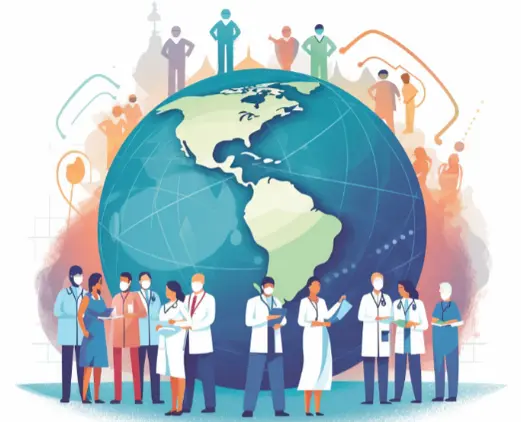The World Health Organization: Safeguarding Global Health
In a world increasingly interconnected, global health challenges require global solutions. Enter the World Health Organization (WHO), a specialized agency of the United Nations (UN) at the forefront of safeguarding human health worldwide.
This blog dives into the WHO’s vital role, exploring its key functions, impactful initiatives, and ongoing efforts to ensure health for all.
A-Pillar of Global Health Governance
Established in 1948, the WHO’s constitution enshrines its mission: “the attainment by all peoples of the highest level of health.” With 194 member states, the WHO acts as a coordinating body, setting international health standards and norms.
Core Functions: Guiding Principles for Global Health
The WHO’s work encompasses a broad range of activities:
-
Leading Global Health Efforts: The WHO tackles pressing health challenges like infectious diseases, chronic illnesses, and mental health. It provides technical assistance to countries, develops guidelines, and coordinates responses to health emergencies.
-
Setting International Health Standards: The WHO establishes global standards for safe and effective medicines, vaccines, and medical devices. These standards ensure quality control and protect public health.
-
Monitoring and Surveillance: The WHO tracks disease outbreaks and trends, providing early warning systems for emerging threats. It also collects and disseminates health data globally.
-
Promoting Health Research: The WHO fosters international collaboration on health research, accelerating the development of new treatments and interventions.
-
Advocating for Health Equity: The WHO champions the principle of “health for all,” advocating for equitable access to healthcare services for all populations, regardless of income or geographical location.
Landmark Initiatives: The WHO’s Impact on Human Health
The WHO’s work has had a profound impact on global health:
-
Eradicating Smallpox: The WHO spearheaded the successful global smallpox eradication campaign, declaring the disease eradicated in 1980.
-
Combating HIV/AIDS: The WHO plays a crucial role in the global fight against HIV/AIDS, promoting prevention, treatment, and access to antiretroviral therapy.
-
Maternal and Child Health: The WHO works to reduce maternal mortality and improve child health through various initiatives, promoting safe childbirth practices and vaccinations.
-
Addressing Non-Communicable Diseases: The WHO tackles the growing burden of non-communicable diseases like heart disease, cancer, and diabetes by promoting healthy lifestyles and prevention strategies.
Looking Forward: The WHO’s Ongoing Challenges
The WHO faces a dynamic global health landscape with emerging challenges:
-
Antimicrobial Resistance: The rise of antibiotic-resistant bacteria threatens global health. The WHO leads efforts to promote responsible antibiotic use and develop new treatments.
Climate Change and Health: Climate change poses new threats to human health, with rising temperatures increasing the risk of vector-borne diseases. The WHO advocates for climate action to protect health.
-
Universal Health Coverage: The WHO promotes universal health coverage, ensuring everyone has access to the health services they need without facing financial hardship.
The Road to a Healthier World: Partnering with the WHO
The WHO relies on collaboration with member states, international organizations, civil society, and the private sector to achieve its goals. Individuals can also play a part in supporting the WHO’s work by promoting healthy behaviors in their communities and advocating for global health initiatives.
By understanding the WHO’s vital role and ongoing efforts, we can collectively work towards a healthier and more equitable world for all.


Comments are closed, but trackbacks and pingbacks are open.